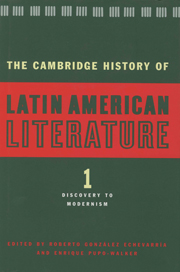Book contents
- Frontmatter
- Introduction to Volume 1
- 1 A brief history of the history of Spanish American Literature
- 2 Cultures in contact: Mesoamerica, the Andes, and the European written tradition
- 3 The first fifty years of Hispanic New World historiography: the Caribbean, Mexico, and Central America
- 4 Historians of the conquest and colonization of the New World: 1550–1620
- 5 Historians of the colonial period: 1620–1700
- 6 Colonial lyric
- 7 Epic poetry
- 8 Spanish American theatre of the colonial period
- 9 Viceregal culture
- 10 The eighteenth century: narrative forms, scholarship, and learning
- 11 Lyric poetry of the eighteenth and nineteenth centuries
- 12 Spanish American theatre of the eighteenth century
- 13 The nineteenth-century Spanish American novel
- 14 The brief narrative in Spanish America: 1835–1915
- 15 The Spanish American theatre of the nineteenth century
- 16 The essay in Spanish South America: 1800 to Modernismo
- 17 The essay of nineteenth-century Mexico, Central America, and the Caribbean
- 18 The gaucho genre
- Index
- Bibliographies
- References
18 - The gaucho genre
Published online by Cambridge University Press: 28 March 2008
- Frontmatter
- Introduction to Volume 1
- 1 A brief history of the history of Spanish American Literature
- 2 Cultures in contact: Mesoamerica, the Andes, and the European written tradition
- 3 The first fifty years of Hispanic New World historiography: the Caribbean, Mexico, and Central America
- 4 Historians of the conquest and colonization of the New World: 1550–1620
- 5 Historians of the colonial period: 1620–1700
- 6 Colonial lyric
- 7 Epic poetry
- 8 Spanish American theatre of the colonial period
- 9 Viceregal culture
- 10 The eighteenth century: narrative forms, scholarship, and learning
- 11 Lyric poetry of the eighteenth and nineteenth centuries
- 12 Spanish American theatre of the eighteenth century
- 13 The nineteenth-century Spanish American novel
- 14 The brief narrative in Spanish America: 1835–1915
- 15 The Spanish American theatre of the nineteenth century
- 16 The essay in Spanish South America: 1800 to Modernismo
- 17 The essay of nineteenth-century Mexico, Central America, and the Caribbean
- 18 The gaucho genre
- Index
- Bibliographies
- References
Summary
Introduction
The gaucho genre or gaucho poetry originates in the Río de la Plata region at the beginning of the nineteenth century. Its constitutive elements include: the traditional Spanish songs and ballads that were disseminated by the Spanish explorers and conquerors from as early as the sixteenth century, the poetry of the payadores (illiterate peasants who, accompanied by their guitars, roamed the country singing ballads and often competing against each other in payadas or contrapuntos), the dramatic essays that brought to the stage the dialogues in rustic language of the colonial peasantry, and, finally, contemporary “cultivated” poetry. From the traditional sources, the genre adopts its octosyllabic meter and strophic forms; from the poetry of the payadores, it appropriates the character of the gaucho-singer, together with many tones and themes of his song; the dialogue, meanwhile, is inherited from the primitive theatre. But the gaucho genre was written, in its entirety, by literate, urban poets, many of whom also wrote neoclassical and romantic poetry. These poets, who were sometimes involved in either the military or in politics, utilized the rustic language of the gauchos and politicized it, on the basis of the wars of independence, which can be designated as the beginning of the genre. Some critics look for the genre’s origins in the last years of the eighteenth century, during which colonial Argentina battled with Portugal and, more specifically, in an anonymous one-act farce entitled “El amor de la estanciera,” which was staged in the last decade of the century and made reference to the Argentinian-Portuguese war.
- Type
- Chapter
- Information
- The Cambridge History of Latin American Literature , pp. 608 - 631Publisher: Cambridge University PressPrint publication year: 1996
References
- 9
- Cited by



